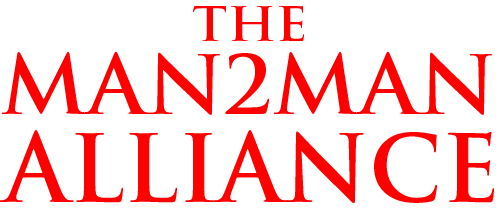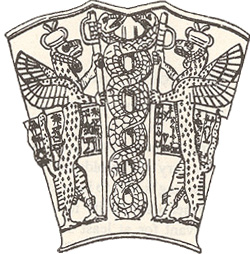










An Overview
by
Bill Weintraub

We live in a country in which there's a lot of religion but not much spirituality. There are two reasons for that: one is the scientific revolution, which has knocked out the underpinnings of much of traditional religion, and the other is institutionalized Christianity itself, which is inflexible and has appropriated a beautiful, almost universal myth of the ancient Near East, that of the young, handsome god who dies and is yearly reborn, and turned it into an historical event, which is said to have taken place only once, and in which one must believe totally, or be without faith.
People in ages past, however, have had far more mythological support for their lives, and that's particularly true of men who loved other men.
The most important of those myths for men like ourselves is, I believe, Gilgamesh, which is ancient, dating at least to 2700 BCE, and which survived into our era on some bits of cuneiform that were found in the shattered library of King Ashurbanipal of Assyria. When he first read it, it was already 2000 years old, and the Sumerians, who created it and the world's first great civilization, themselves had long been dust.
It had and has such a formidable shelf life because it addresses a number of psychological truths, and presents models for some of life's great challenges, among them sex, love, and death.
At its most basic, Gilgamesh is the story of two warriors, superheroes we would call them, who meet, wrestle, and become lovers. But their histories are complex, for they represent two opposing principles: city and country.
Gilgamesh, considered two-thirds a god by his subjects, is a mighty warrior who rules a great city. But he's also promiscuous sexually, with both youths and maidens, and since no one can refuse him, the people of his city appeal to the gods to do something to curb his appetites.
The gods respond by creating a male companion for him, another warrior named Enkidu.
It's not surprising that the gods would decide to fashion a man out of their own spit and the rich earth of the fertile crescent in order to bring into being someone who will have the force to capture Gilgamesh' heart and turn him from promiscuity. The idea that men make the best companions and lovers for other men was common in the ancient world. That was because women had relatively little freedom of action, and marriages were arranged, socio-political phenomena. But male friendships, as well as romances, were freely chosen, and so were considered highly desirable. And although the primacy of male-male romance doesn't peak until the height of Greek civilization, more than 2,000 years after Gilgamesh was written, it's already present in the Sumerian epic.
So it's natural for the gods to decide that the best way to curb Gilgamesh' promiscuity is to arrange for him to have a male lover. But, they don't simply give Enkidu to Gilgamesh. Instead, they set Enkidu down deep in the forest, where he lives like an animal and becomes the protector of the animals - something like Tarzan, a completely natural being who sees no difference between himself and the rest of creation.
That too becomes a problem for the local people, since he won't them let hunt or trap, and they in turn send a temple prostitute to Enkidu to civilize him.
She does, somewhat, by sleeping with him and so making the animals afraid of him, but she also tells him about Gilgamesh, a mighty warrior, the mightiest in the land. Her words anger Enkidu, who has always believed that he is the mightiest creature in existence.
As he thinks about Gilgamesh, Enkidu's anger grows, but he doesn't act upon it till he learns that his rival is about to marry. That news truly enrages Enkidu, and he leaves the forest and goes to Uruk, Gilgamesh' city, and forces his way into the palace, bars the door to the bridal chamber, and there challenges the mighty warrior-king.
Of course Gilgamesh is himself infuriated by Enkidu's intrusion, and so these two enraged heroes, mighty, god-like warriors, have a titanic wrestling bout all through the city, in which they knock down walls and destroy buildings and in general wreak the sort of havoc that superheroes do when they're battling.
But what happens at the end of the bout is not what we would expect. For Gilgamesh defeats Enkidu, pins him, but instead of humiliating him or imprisoning him or killing him, Gilgamesh, in an act of true nobility, allows Enkidu to rise, and they embrace, and kiss, and go off together hand in hand.
And they become constant companions and lovers, recognized as such by Gilgamesh' family, his subjects, and the gods.
So that's the first great lesson of the story: that sex is always available, but that love must be fought for and won.
And that sometimes contained in a great anger is a great love.
Their wrestling match, then, is a metaphor for the struggle entailed in finding that love.
Having found each in the other his ideal, Gilgamesh and Enkidu embark on a series of heroic adventures, challenging monsters like Wawa, lord of a great cedar forest, and the Bull of the Sun.
Together, Gilgamesh and Enkidu constitute a smooth, unstoppable team, two men who understand each other intimately and whose rallying cry in battle is "Two people, companions, they can prevail!"
And that's the second great lesson of the myth: that a loving couple can surmount almost any obstacle.
But, eventually the gods, and especially Ishtar, whom Gilgamesh has rejected sexually, begin to fear that Gilgamesh and Enkidu are becoming too powerful, and decide they must be reigned in. The question for Ishtar is what will most hurt Gilgamesh, and the answer is simple: killing Enkidu.
And so the gods send a wasting illness to Enkidu, and Gilgamesh becomes his caregiver, striving vainly to save the life of the man he loves. Sometimes it's hard for Gilgamesh to accept what's happening to Enkidu, and he tries to deny the ugly reality of the disease that's consuming his lover, seeking to comfort him and himself with false hope and empty cheer.
But it's of no use.
Ultimately, Enkidu, created by the gods to be Gilgamesh' companion, is destroyed by them, and Gilgamesh is left alone.
Gilgamesh is wracked by grief and pain, and though he erects a monument to his dead lover, he finds that his old life is meaningless. He gives up the rulership of his city, and embarks on a fruitless quest for immortality.
And that's the third great lesson of the myth. That sometimes terrible things happen to those we love, and that in the aftermath we cannot go on with our lives as usual, but must undertake heroic tasks to try to again find ourselves.
Gilgamesh is one of the great epics and one of the greatest and most psychologically acute myths of all mankind. And, for men into m2m, it presents a remarkable model of strong, masculine, heroic men who fight, wrestle, fall in love, and become inseparable companions in the battles of life. They love each other deeply, and their love is recognized by gods and mortals alike. Finally, when one falls ill the other cares for him tenderly and faithfully, and when he dies his warrior-lover's anguish is commensurate with their love.
So it describes, and brilliantly models behavior for, almost the entire life-cycle of a warrior pair. As such it's invaluable for men bonded erotically with other men. It shows us warriors who are loving companions to each other, it teaches the twin virtues of courage and compassion, and it's honest about the perils of love and loss.
And it's a story told with great concision and clarity.
In its brilliance, economy, and honesty, Gilgamesh is one of the great treasures of the human race.
If you've longed for a superhero all your life, and have never read Gilgamesh, check out the David Ferry translation.
You'll see that you're not alone.

AND

Gilgamesh A New Rendering in English by David Ferry
PS The image at the top of the page is from a late Sumerian vase, ca. 2025 BCE -- The Serpent Lord, Ningizzida, Lord of the Tree of Truth. He's flanked by two lion birds, as they're called, bearing swords. To learn more about the meaning of this sort of double phallic image, ck out Phallic, Masculine, Heroic -- you'll be glad you did.

the myth lives


is presented by The Man2Man Alliance, an organization of men into Frot
Click here to read An Introduction to Frot and The Man2Man Alliance.
Click here to learn more about Heroic Homosex.
And here to learn more about Heroes.
Or here to visit our FAQs page and learn more about Frot Men.


© All material on this site Copyright 2001 - 2011 by Bill Weintraub. All rights reserved.